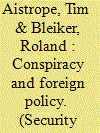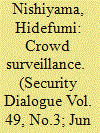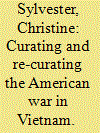|
|
|
Sort Order |
|
|
|
Items / Page
|
|
|
|
|
|
|
| Srl | Item |
| 1 |
ID:
159784


|
|
|
|
|
| Summary/Abstract |
Conspiracies play a significant role in world politics. States often engage in covert operations. They plot in secret, with and against each other. At the same time, conspiracies are often associated with irrational thinking and delusion. We address this puzzle and highlight the need to see conspiracies as more than just empirical phenomena. We argue that claims about conspiracies should be seen as narratives that are intrinsically linked to power relations and the production of foreign policy knowledge. We illustrate the links between conspiracies, legitimacy and power by examining multiple conspiracies associated with 9/11 and the War on Terror. Two trends are visible. On the one hand, US officials identified a range of conspiracies and presented them as legitimate and rational, even though some, such as the alleged covert development of weapons of mass destruction in Iraq, are now widely considered false. On the other hand, conspiracies circulating in the Arab-Muslim world were dismissed as irrational and pathological, even though some, like those concerned with the covert operation of US power in the Middle East, were based on credible concerns.
|
|
|
|
|
|
|
|
|
|
|
|
|
|
|
|
| 2 |
ID:
159786


|
|
|
|
|
| Summary/Abstract |
The recent proliferation of the securitization of crowded places has led to a growth in the development of technologies of crowd behaviour analysis. However, despite the emerging prominence of crowd surveillance in emergency planning, its impacts on our understanding of security and surveillance have received little discussion. Using the case of crowd surveillance in Tokyo, this article examines the ways in which crowds are simulated, monitored and secured through the technology of crowd behaviour analysis, and discusses the implications on the politics of security. It argues that crowd surveillance constitutes a unique form of the biopolitics of security that targets not the individual body or the social body of population, but the urban body of crowd. The power of normalization in crowd surveillance operates in a preemptive manner through the codification of crowd behaviour that is spatially and temporarily specific. The article also interrogates the introduction of crowd surveillance in relation to racialized logics of suspicion and argues that, despite its appearance as non-discriminatory and ‘a-racial’, crowd surveillance entails the racial coding of crowd behaviour and urban space. The article concludes with the introduction of crowd surveillance as a border control technology, which reorients existing modalities of (in)securitization at airports.
|
|
|
|
|
|
|
|
|
|
|
|
|
|
|
|
| 3 |
ID:
159783


|
|
|
|
|
| Summary/Abstract |
The American war in Vietnam killed 58,000 US military personnel and millions of people on the ground, creating a troubling war legacy that has been ‘resolved’ in the USA through state strategies to efface military mortalities. Drawing on Charlotte Heath-Kelly’s work addressing mortality denied or ignored in the field of international relations and that of Andrew Bacevich and Christian Appy on American militarism, I explore the Vietnam Veterans Memorial in Washington, DC, as a site of war re-curations that refuse the effacement of mortality and disrupt the militarist myths that sustain it – namely, that America is renewed and revitalized through war, and that soldiers live on as American heroes when they sacrifice for the country. With the Vietnam Syndrome long since replaced by insistence on loving all soldiers, even if not all the country’s wars, the Vietnam Veterans Memorial is dedicated to remembering those who were not publicly acknowledged for fighting and dying in America’s failed war. Assemblages of pictures, letters, and other items that a community of loss leaves at the Memorial re-curate the war by showing the lingering pain that war mortality inflicts on those who experience it decade upon decade. Taken together, the objects of war shown at the Vietnam Veterans Memorial and collected each evening put mortality at the heart of war experience. The Memorial is therefore a key location of knowledge that challenges militarist appeals and state effacements in favor of what Viet Thanh Nguyen calls ‘just memory’ of war.
|
|
|
|
|
|
|
|
|
|
|
|
|
|
|
|
| 4 |
ID:
159787


|
|
|
|
|
| Summary/Abstract |
This article provides a genealogy of the governance of critical infrastructure in Canada. We focus in particular on a largely unknown and unexamined civil defense initiative introduced during World War II that sought to count, categorize and, under declaration of a national emergency, directly protect what were then known as ‘vital points’ from sabotage. Our analysis recounts major episodes and turning points in the deployment of this organizational apparatus by the various institutions responsible for civil defence and emergency management in which it was embedded. In the latter sections of this article we show how the problem of critical infrastructure was decoupled from the exercise of exceptional emergency power and reconstituted in the form of what we refer to as ‘coordinated preparedness’, through which the governance of critical infrastructure is accomplished in ways that are compatible with the constitutionalization of Canada’s emergency power. We conclude by considering what the governance of critical infrastructure in Canada reveals for critical understandings of emergencies and emergency power.
|
|
|
|
|
|
|
|
|
|
|
|
|
|
|
|
| 5 |
ID:
159785


|
|
|
|
|
| Summary/Abstract |
What happens to sovereign power when petty sovereigns refuse to exploit discretionary power to suspend the rule of law, the very power that is delegated to them and makes them who they are? How might such a refusal contribute to a better understanding of the relationship between resistance and sovereign power? This article revisits Judith Butler’s notion of petty sovereigns to explore the possibility that petty sovereigns establish a distinctive relationship with law. This article draws on a case involving one nameless petty sovereign and his published writings. He writes novels to expose how law is used by some officials to realize a particular policy goal with regards to nuclear energy. His novels blur the line between fiction and non-fiction: it contains classified information only available to bureaucrats, discusses actual energy policies and related laws, and introduces fictional characters who resemble non-fictional characters. I argue that this example suggests that petty sovereigns are not necessarily tied to the node between governmentality and sovereignty. Shifting between the worlds of fiction and non-fiction, petty sovereigns slip away from sovereign power, which controls the subject-making process, and quietly resist sovereign politics through the contingency of subjectivity.
|
|
|
|
|
|
|
|
|
|
|
|
|
|
|
|
|
|
|
|
|